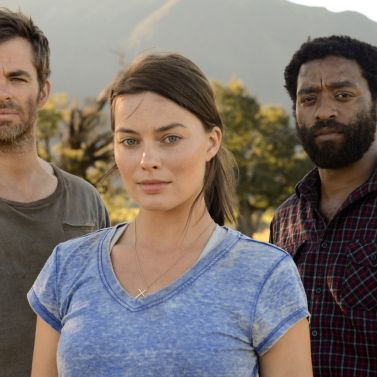
Craig Zobel’s previous two features made serious waves at Sundance — The Great World of Sound was a hit at the 2007 festival, and 2012’s Compliance set off something of a controversy. Understandably, his third film, a dystopian drama powered by a trio of movie stars (Chiwetel Ejiofor, Chris Pine, and Wolf of Wall Street’s Margot Robbie) was much anticipated here; even some veteran press lined up two and a half hours early to get into Z for Zachariah. The new film, however, is nothing like Zobel’s last two; it has none of the rambling generosity of Great World of Sound or the edgy topicality of Compliance.
Based on Robert C. O’Brien’s novel, the film takes place in a magnificent valley where the devastated schools, stores, and houses strike a sharp contrast with the sun-dappled fields, the shining lakes, and rich forests. Anne (Margot Robbie), the sole human inhabitant, ekes out a meager living among the vestiges of this postapocalyptic Eden. Her lonely existence is interrupted by the arrival of John Loomis (Chiwetel Ejiofor), a scientist who has been wandering the countryside in a radioactive-safe suit; when he finally takes off his mask and discovers he can breathe clean air again, he weeps for joy.
Anne — young, devout, sheltered — could use a man like John around; she even prays to God to keep him around. Together, they settle into a wary domesticity, loaded with both religious and sexual tension. He looks for scientific reasons why the valley’s been spared the radioactive fallout; she’s convinced it’s the work of God. He wants to tear down a wooden church to build a waterwheel for electricity; she refuses, as the church was built by her preacher father. He gets piss-drunk and makes an advance at her, which she refuses; the following night, she gets toasted and makes a pass at him — and he refuses.
When it focuses on the fraught interplay between Anne and John, Z for Zachariah is wonderful; I could have watched these small human moments, alternately tense and tender, between Ejiofor and Robbie forever. Eventually, however, another man arrives — Caleb (Chris Pine), a local miner who survived deep underground and then decided to try his luck outside. The love triangle that follows interrupts more than John and Anne’s lives; it turns a moody, absorbing portrait of a compromised relationship into something more schematic and melodramatic. Caleb and Anne have a lot in common, and John can’t help but feel like a third wheel around them. The film illustrates their dynamic in the most uninspired way possible, with regular cuts to Ejiofor’s face looking silent and jealous at the end of every exchange between Pine and Robbie; seriously, you could turn it into a meme or a drinking game. The descent into a tepid thriller of sexual jealousy slowly negates the abstract, almost metaphorical quality of this film — and it ultimately undoes the spell cast by that mesmerizing first half.


